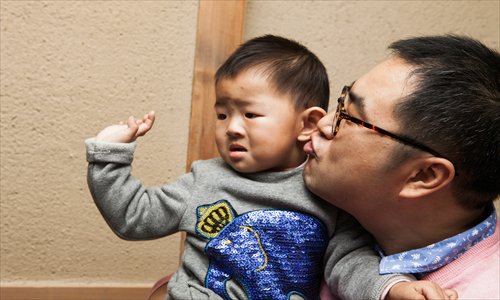Don’t kiss my baby!
Parents risk transmitting diseases to their children through excessive physical intimacy

Common infections transmitted to a child via saliva can help to strengthen a child's immune system in the long-term. Photo: Li Hao/GT
Some doctors are warning parents to resist the urge to smother their children with kisses after an infant girl in Hubei Province was hospitalized with a virus most likely transmitted to her via the transfer of saliva from adults.
Last week, the Changjiang Daily reported that a 2-year-old girl, Ni Ni (pseudonym), was admitted to Wuhan Hankou Hospital with a high fever and facial paralysis, which doctors suspected was due to a virus she had contracted after being showered with kisses the day before by an acquaintance of her mother's.
"Of course, we're not saying that kissing one's children should be banned - such interactions are a necessary part of a child's growth and to the development of their immune system. But extra care should be taken," said Yang Zefang, pediatrician at the Dingxiangyun Children's Health Clinic in Fuzhou, Fujian province. "The development of a child's immune system is a slow and gradual process, so young children, who are particularly vulnerable to infectious viruses, should not be exposed to excessive physical intimacy."
Adults who are themselves suffering from colds or mouth ulcers should refrain from physical intimacy with children altogether, said Yang.
Ni Ni was diagnosed with Epstein-Barr virus (EBV), a common virus carried by almost all adults, known colloquially as the "kissing disease."
"EBV is a herpes virus carried by more than 90 percent of adults that can be transmitted through the oral transfer of saliva," said Yang. "Most children who are infected with it show no symptoms or only very mild symptoms, but for a small number of children, the symptoms can be quite severe."
These symptoms, said Yang, can include high fever, enlargement of the lymph nodes, and a swelling of liver and spleen.
"Besides common symptoms, the infection may also cause complications including hemophagocytic syndrome and Hodgkin's disease, and trigger more horrible diseases such as nasopharynx cancer and AIDS," said Yang. "In rare cases, patients may suffer from facial paralysis, like the girl in the recent news report."
Yang said that two other common viruses transferred to children via saliva were HHV-6 and HHV-7, which typically affect all human beings before the age of two. In most cases, the viruses result in a sudden fever and a rash, although in rare cases, the child may also experience from febrile convulsions - a mild epileptic seizure after which a child will return to normal.
Besides limiting the number of kisses a parent gives to their child, Yang advised adults against several common practices which may lead to caregivers passing infectious diseases to their children, such as personally chewing up food for a child to make it easier for them to swallow, or sucking a child's snot or phlegm with their own mouths to help clear the child's throat or nose.
Finally, Yang advised parents to refrain from allowing their children to be excessively coddled by other adults.
"Just say no [to people who want to kiss and touch your children]," said Yang. "It isn't rude or impolite, it's simply for the sake of the child's safety."
However Jerry Zeng, a doctor at Beijing-based international health clinic United Family Healthcare, said such warnings were a needless overreaction.
"Parents don't need to be overly cautious," he said. "They don't need to be overprotective by deliberately reducing intimate physical contact with their children."
"Common viral and bacterial infections [such as those transferred by a parent's saliva] also have a positive effect, in that they prepare a child's immune system to be able to cope with more serious infections in later life."